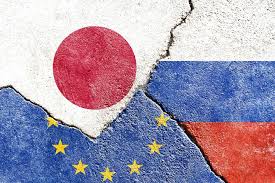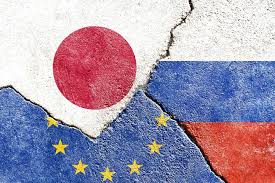
Japan’s new Prime Minister Sanae Takaichi firmly resisted U.S. pressure to halt imports of Russian liquefied natural gas (LNG) during her first high-level meeting with President Donald Trump in Tokyo. The exchange highlighted Japan’s delicate balancing act between maintaining alliance solidarity and protecting its fragile energy security. Takaichi made clear that cutting Russian gas supplies would be economically damaging and strategically counterproductive, telling Trump that such a move “would only make China and Russia happy.”
Energy Security Before Alliance Conformity
Japan’s stance reflects the structural reality of its energy dependence. The country imports nearly all of its fossil fuel needs, with LNG accounting for over a third of its total energy consumption. Roughly 9 percent of that LNG comes from Russia, mainly through the Sakhalin-2 project—one of the few ventures in which Japanese companies Mitsui & Co. and Mitsubishi Corp. retain equity stakes. The facility, located in Russia’s Far East, has long provided Japan with stable supply at competitive rates.
For Tokyo, abruptly ending Russian LNG imports would mean more than just lost volumes; it would create ripple effects across the economy. Replacing Sakhalin-2 supply would require expensive purchases from spot markets or long-term contracts with U.S. and Middle Eastern suppliers—driving up electricity prices for households and industries already squeezed by inflation. Japan’s industry minister recently warned that losing Russian gas would make electricity “significantly more costly,” undermining competitiveness and energy reliability.
Japan has been trying to diversify sources, purchasing increasing amounts of U.S. LNG and exploring renewable and nuclear expansion. Yet these alternatives cannot immediately replace Russian supply. Many of Japan’s Sakhalin-2 contracts stretch through 2028-2033, meaning any disruption before that period would trigger contractual penalties and create energy gaps. Takaichi’s cautious stance thus reflects pragmatic recognition of Japan’s structural constraints, not diplomatic defiance.
Strategic Calculations Behind Japan’s Pushback
Takaichi’s position also stems from a wider geopolitical calculus. Japan’s energy dependence has long been a national vulnerability, shaping how it approaches sanctions and global crises. While Tokyo joined G7 measures targeting Russian oil and imposed a price cap on crude imports, it has consistently drawn a line at LNG—viewing it as essential for national security and industrial stability.
In the meeting with Trump, Takaichi reportedly stressed that ending LNG imports would not weaken Moscow meaningfully; instead, it would hand greater leverage to China and India, who continue buying Russian energy. From Tokyo’s perspective, walking away from Sakhalin-2 would vacate strategic space that Beijing could easily fill. China has already deepened cooperation with Russian energy firms and secured discounted LNG cargoes to bolster its own energy security. Japan’s withdrawal would only shift that advantage eastward across the Sea of Japan, not advance Western sanctions goals.
There is also a domestic political dimension. As Japan’s first female prime minister, Takaichi has sought to project firmness in defending the national interest. Her approach to the U.S. request—firm but respectful—signals continuity with Japan’s traditional foreign-policy principle of maintaining close alliance ties while asserting autonomy in energy and trade matters. She inherits a long-standing doctrine that Japan’s alliance with Washington does not preclude pragmatic engagement with Moscow when energy security is at stake.
In this context, Japan’s limited compliance with U.S. energy sanctions is less about defiance and more about self-preservation. Even with the rise of nuclear restarts and renewable projects, LNG remains Japan’s baseload stabilizer—especially in winter months when solar and wind generation falter. This makes any decision to fully disengage from Russian supply strategically premature.
The Broader Implications for U.S.–Japan Relations
The episode exposes the evolving dynamics between Washington and Tokyo in an era where energy, economics and security are deeply intertwined. For the United States, the request to halt Russian energy imports forms part of a global strategy to isolate Moscow financially. For Japan, however, compliance without compensation risks self-inflicted energy shocks and domestic backlash. The difference in priorities is not about alliance loyalty but structural exposure: Washington is a net energy exporter; Tokyo is among the world’s most import-dependent nations.
Takaichi’s pushback may mark an inflection point in Japan’s foreign-policy posture—one that emphasizes national energy sovereignty even amid strategic alignment with Western partners. Tokyo has already boosted LNG purchases from the United States and Qatar, but a full pivot away from Russian sources will require infrastructure expansion, new long-term contracts, and stable domestic political consensus. Until then, Japan’s strategy appears to be one of “calibrated continuity”: sustaining ties with Moscow in critical energy sectors while deepening cooperation with Western partners elsewhere.
While some in Washington may view Japan’s stance as reluctance, others see it as realism. The U.S. itself benefits from Japan’s energy stability, given the two nations’ intertwined manufacturing and defence supply chains. Tokyo’s steady approach ensures predictability in Asian energy markets, which in turn stabilizes global LNG prices—a shared strategic interest.
In essence, Japan’s refusal to sever Russian LNG ties underscores the limits of sanctions diplomacy when energy dependency collides with national imperatives. Takaichi’s message to Trump was not one of resistance but of reality: energy diversification takes time, and stability must come before symbolism.
Through this exchange, Japan reaffirmed its role as both a steadfast ally and an independent actor navigating an increasingly multipolar energy world—where national interest, not just alliance obligation, shapes the calculus of cooperation.
(Source:www.japantimesco.jp)
Energy Security Before Alliance Conformity
Japan’s stance reflects the structural reality of its energy dependence. The country imports nearly all of its fossil fuel needs, with LNG accounting for over a third of its total energy consumption. Roughly 9 percent of that LNG comes from Russia, mainly through the Sakhalin-2 project—one of the few ventures in which Japanese companies Mitsui & Co. and Mitsubishi Corp. retain equity stakes. The facility, located in Russia’s Far East, has long provided Japan with stable supply at competitive rates.
For Tokyo, abruptly ending Russian LNG imports would mean more than just lost volumes; it would create ripple effects across the economy. Replacing Sakhalin-2 supply would require expensive purchases from spot markets or long-term contracts with U.S. and Middle Eastern suppliers—driving up electricity prices for households and industries already squeezed by inflation. Japan’s industry minister recently warned that losing Russian gas would make electricity “significantly more costly,” undermining competitiveness and energy reliability.
Japan has been trying to diversify sources, purchasing increasing amounts of U.S. LNG and exploring renewable and nuclear expansion. Yet these alternatives cannot immediately replace Russian supply. Many of Japan’s Sakhalin-2 contracts stretch through 2028-2033, meaning any disruption before that period would trigger contractual penalties and create energy gaps. Takaichi’s cautious stance thus reflects pragmatic recognition of Japan’s structural constraints, not diplomatic defiance.
Strategic Calculations Behind Japan’s Pushback
Takaichi’s position also stems from a wider geopolitical calculus. Japan’s energy dependence has long been a national vulnerability, shaping how it approaches sanctions and global crises. While Tokyo joined G7 measures targeting Russian oil and imposed a price cap on crude imports, it has consistently drawn a line at LNG—viewing it as essential for national security and industrial stability.
In the meeting with Trump, Takaichi reportedly stressed that ending LNG imports would not weaken Moscow meaningfully; instead, it would hand greater leverage to China and India, who continue buying Russian energy. From Tokyo’s perspective, walking away from Sakhalin-2 would vacate strategic space that Beijing could easily fill. China has already deepened cooperation with Russian energy firms and secured discounted LNG cargoes to bolster its own energy security. Japan’s withdrawal would only shift that advantage eastward across the Sea of Japan, not advance Western sanctions goals.
There is also a domestic political dimension. As Japan’s first female prime minister, Takaichi has sought to project firmness in defending the national interest. Her approach to the U.S. request—firm but respectful—signals continuity with Japan’s traditional foreign-policy principle of maintaining close alliance ties while asserting autonomy in energy and trade matters. She inherits a long-standing doctrine that Japan’s alliance with Washington does not preclude pragmatic engagement with Moscow when energy security is at stake.
In this context, Japan’s limited compliance with U.S. energy sanctions is less about defiance and more about self-preservation. Even with the rise of nuclear restarts and renewable projects, LNG remains Japan’s baseload stabilizer—especially in winter months when solar and wind generation falter. This makes any decision to fully disengage from Russian supply strategically premature.
The Broader Implications for U.S.–Japan Relations
The episode exposes the evolving dynamics between Washington and Tokyo in an era where energy, economics and security are deeply intertwined. For the United States, the request to halt Russian energy imports forms part of a global strategy to isolate Moscow financially. For Japan, however, compliance without compensation risks self-inflicted energy shocks and domestic backlash. The difference in priorities is not about alliance loyalty but structural exposure: Washington is a net energy exporter; Tokyo is among the world’s most import-dependent nations.
Takaichi’s pushback may mark an inflection point in Japan’s foreign-policy posture—one that emphasizes national energy sovereignty even amid strategic alignment with Western partners. Tokyo has already boosted LNG purchases from the United States and Qatar, but a full pivot away from Russian sources will require infrastructure expansion, new long-term contracts, and stable domestic political consensus. Until then, Japan’s strategy appears to be one of “calibrated continuity”: sustaining ties with Moscow in critical energy sectors while deepening cooperation with Western partners elsewhere.
While some in Washington may view Japan’s stance as reluctance, others see it as realism. The U.S. itself benefits from Japan’s energy stability, given the two nations’ intertwined manufacturing and defence supply chains. Tokyo’s steady approach ensures predictability in Asian energy markets, which in turn stabilizes global LNG prices—a shared strategic interest.
In essence, Japan’s refusal to sever Russian LNG ties underscores the limits of sanctions diplomacy when energy dependency collides with national imperatives. Takaichi’s message to Trump was not one of resistance but of reality: energy diversification takes time, and stability must come before symbolism.
Through this exchange, Japan reaffirmed its role as both a steadfast ally and an independent actor navigating an increasingly multipolar energy world—where national interest, not just alliance obligation, shapes the calculus of cooperation.
(Source:www.japantimesco.jp)





